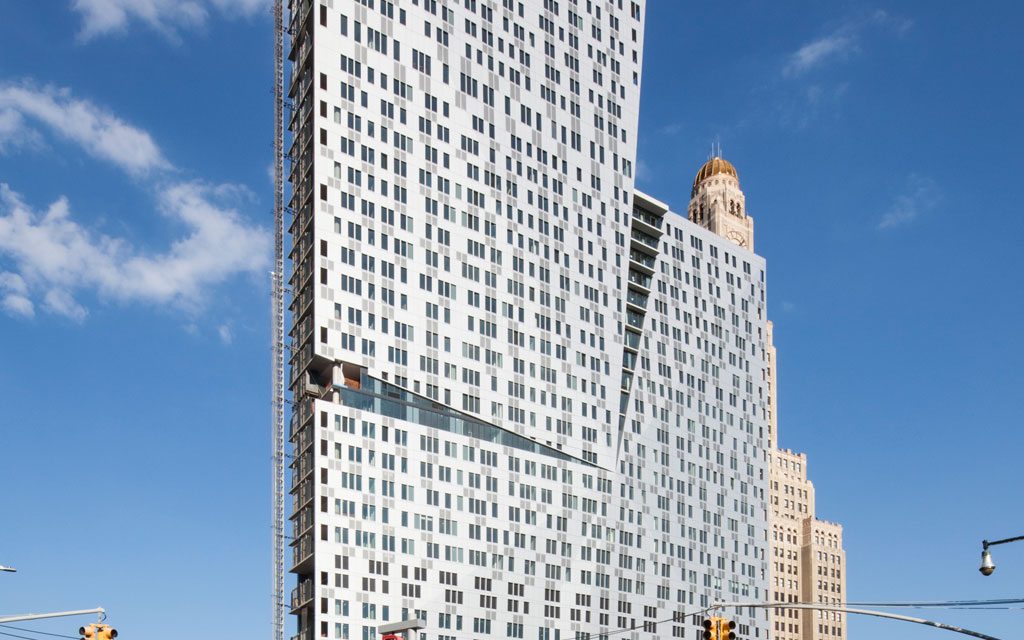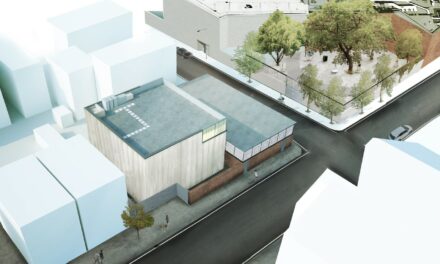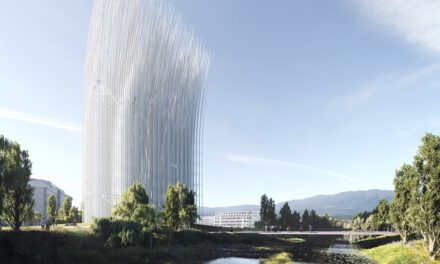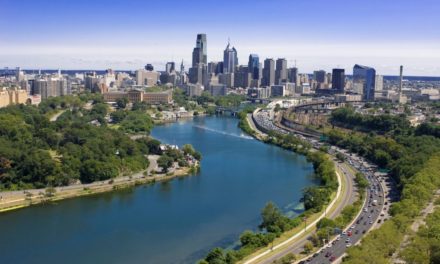Architect: TEN Arquitectos
Developer: Two Trees Management
Consultant: Front, Inc.
Metal Fabricator: Eastern Exterior Wall Systems (EEWS)
Products: REYNOBOND® Aluminum Composite Material (ACM), ALCOA Architectural Products
Metal Coatings: DURANAR® XL coatings by PPG
Soaring above Brooklyn’s thriving Fort Greene neighborhood, BAM South is a monument to the growing design possibilities associated with metal architecture and sophisticated design and modeling software.
Designed by Enrique Norten of TEN Arquitectos, the 32-story structure features REYNOBOND aluminum composite material (ACM) panels by ALCOA Architectural Products fabricated into pans and finished with DURANAR XL fluoropolymer coatings by PPG. Opened in 2017, the mixed-use building is home to 300 apartments and condominiums, retail stores and 50,000 square-feet of cultural space hosting tenants such as the Brooklyn Academy of Music Cinemas, Brooklyn Public Library, MoCADA and 651 Arts.
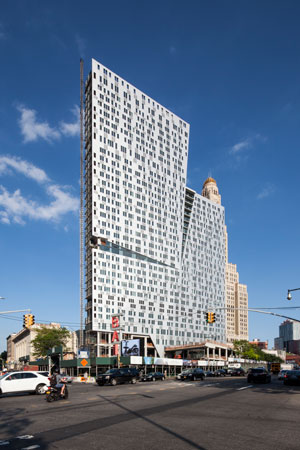
Photographer: Jill Frederickson/Front Inc.
Towering from a transparent, boat-shaped pedestal of glass and metal, the crown jewel of BAM South is a multi-dimensional façade that incorporates 14 intricately designed facets, oriented and installed in a complex combination of tilts, shapes and angles to create distinct starburst patterns on its east and west elevations.
To produce the starburst effects specified by the architect, developer Two Trees Management hired Front, Inc., a global firm specializing in façade system design, to create detailed three-dimensional models of both elevations. The models were then used to generate coordination documents, material quantities, project data and assembly drawings. They also produced the G-code that prefabricator Eastern Exterior Wall Systems (EEWS) fed into its CNC machines to generate the finished ACM that was installed over the panelized wall system.
Model Design, Fabrication and Installation
The main façade system for BAM South is an ACM rainscreen mechanically fastened to panelized light-guage framing. The rainscreen was painted with Duranar XL coating in a bright silver-metallic finish after field visits revealed it was the best color to highlight the facets and capture changing sky conditions.
Because each ACM panel in the facade is modeled to cantilever at precise angles from the metal stud wall panels – and many incorporate recessed window units tilted plumb to the stud walls – virtually none of the units are fabricated to the same shape or dimension.
The precision used to design, machine and fabricate each element in the starburst elevations was further codified in the labeling and sequencing system Front and EEWS developed to coordinate delivery logistics and panel installation.
Over the course of six months, EEWS erected more than 172,500 square-feet of ACM — encompassing 15,653 pans and 1,282 window units in 584 standard panels — on the walls of BAM South. Another 1,750 perforated ACM panels were installed to ventilate 875 packaged terminal air conditioner (PTAC) units.
The installation protocol developed by the two firms required that the panelized ACM be anchored in sequence from the bottom of the façade to the top, and from left to right across its face — a task further complicated by the lack of plumbed column lines, which are commonly used for panel and façade installations.
To resolve that issue, Front and EEWS assigned X, Y and Z coordinates to corresponding points on the building façade and labled the panels according to where they were to be affixed. The X axis sequenced panels from north-to-south; the Y axis from east-to-west; and the Z axis from bottom-to-top.
Because no single panel could substitute for another, each unit on the two elevations had a unique identifier that every person involved in the project, from the machine shop to the installation crew, had to be able to interpret.
In the end, 117 trailers — including 110 wide-load trailers — were used to ship the panels from EEWS’s fabrication plant in Easton, Pennsylvania to the job site in Brooklyn, a distance of 85 miles. Amazingly, not a single panel was damaged during the half-year it took to fabricate, ship and erect the façade.
Another novel innovation associated with the BAM South façade is the integrated gasket system that Front and EWSS designed for it. Instead of relying on wet-sealing or caulking to produce a weather seal, the system uses perimeter extrusions with three lines of gaskets to create water-tight joints. The integrity of the system was proven during extensive pressurized-water testing in the laboratory and on the jobsite after the panels were installed. It is expected to provide maintenance-free service throughout the life of the building.
Coda
Metal panels and coatings have been on the forefront of building design for decades. While coatings manufacturers continue to add to the library of colors and textures available to architects, the marriage of advanced coatings to sophisticated modeling and fabrication techniques is opening an entirely new world of design possibilities.
Nowhere is that more apparent than on Brooklyn’s newest skyscraper. Aesthetically, the purpose of BAM South’s multi-faceted façade is to articulate the starburst effect envisioned by its designer; but its most important accomplishment may be blazing a trail for the continued ascendance of coated metal on landmark buildings.

